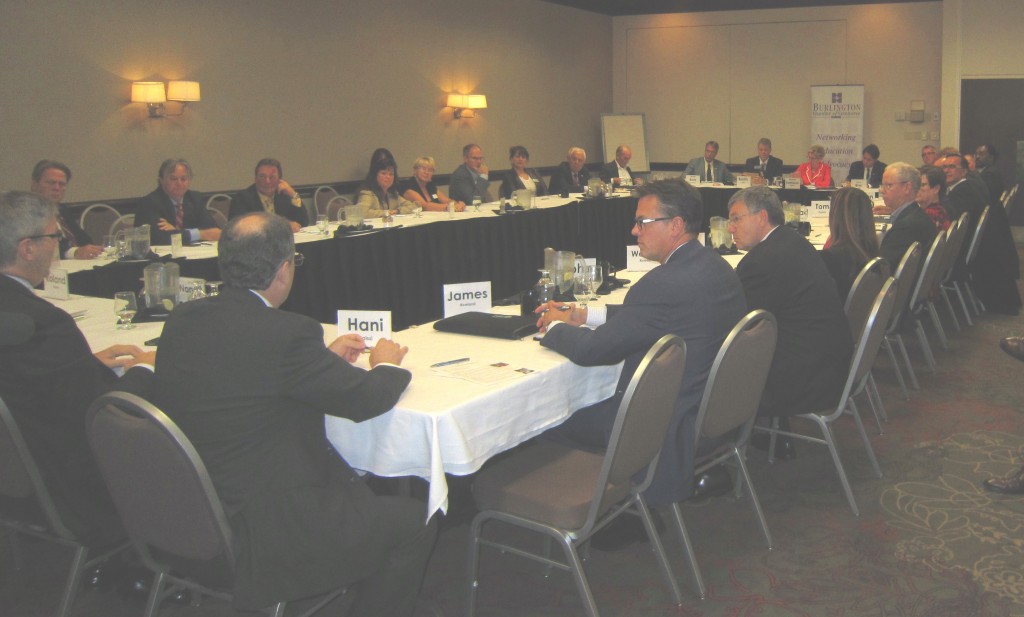By Pepper Parr
BURLINGTON, ON. The Premier was in town for a Roundtable event facilitated by the Chamber of Commerce at which she listened to some 30 + area business people talk privately about jobs and the economy – which has been the anvil Progressive Conservative leader Tim Hudak has been banging his steel hammer on for the past couple of years. The Premier is clearly moving in on territory he had staked out.
The visit was the Premier’s second visit to Burlington this month – does she think the Burlington seat can be won?

Taking part in the Premier’s Roundtable in Burlington were: Tom Hughes, President –EarthFresh; Brad Wiseman, CFO EarthFresh; Sylvia Parr, 1st VP – Ontario Association of Agricultural Societies, and poultry farmer; Ken Forth-Local Farmer and past President of Canadian Horticultural Society; John Sawyer -Oakville Chamber of Commerce; Orla Johnston, Oakville Chamber of Commerce; Wendy Rinella -First Canadian Title; Rocco Delvecchio, Siemens; James Rowland, Ford Canada; Roland Tanner, Tanner Ritchey Publishing; Rick Goldring -Burlington Mayor; Ian Cameron, Burlington Economic Development Corporation, Paul Subject, CEO Stanmech Technologies, Ted Lee, Javelin Techologies; Hani Kaissi, VP-Anaergia; Steve Watzek; CEOAnaergia; John Dehne, President L-3 Wescam; Jean Jacques-Rousseau, Senior Manager AmerisourceBergen; Keith Hoey, President Burlington Chamber of Commerce; Eric Blinkhorn – Konecranes Canada Inc; Gerry Kavanaugh – Apex Composites; Glen Russell – Kontek Ecology Systems Inc.; Heather Gerrie Kwant, Gerrie Electric Wholesale Limited; Heidi Cowie, Stresschat Inc.; John Goodwin-MTE Consultants Inc.; Laurie Nadeau, Bevsupport Corp; Nancy Moore , Centre for Skills Development and Training; Marty Staz, Marty Staz – Royal LePage Burloak Real Estate Services; Michael Clothier, Inter Mune Canada; Sharon Jackman, Service First Forwarding Inc. and Jonathan Levy
Earlier in the week Premier Wynne announced a panel of prominent people who were going to take a deeper look at the public and municipal responses to The Big Move recommendations. You remember that one don’t you? The announcement that we needed billions to upgrade the transportation infrastructure so that we could get people out of their cars and put at least a dent in the grid lock that at times turns the QEW into a parking lot.
The Big Move report estimated $34 billion would be needed to upgrade public transit in the heavily congested region. The problem with that report was there was no consensus on whose pockets that money was to come out of. We all know whose pocket it is going to come from eventually – what’s going on now at all the political levels is none of them wants to be seen as the one that asks for the money.
When the Big Move report got to Burlington’s city council they all sat glumly realizing there wasn’t a thing they could actually do and fearful that the city would be given the job of sucking the money out of your wallets.
The Premier, doing her bit to ease the load on the QEW took GO to Burlington.
That has happened to Burlington before: while health is a provincial responsibility that didn’t stop the province from advising the Mayor that he had to come up with $60 million to pay a share of the cost of re-developing Joseph Brant Hospital. The Mayor gulped because that was all he could do.
Creating a panel to dig through the mounds of reports and find a consensus in there that will keep the public from voting them out of office is a monumental task. Hoping for a decision in December of this year is as close to a pipe dream as you’re likely to get.
This Premier needs an issue that makes her the clear favourite when she goes to the polls and she would like to choose the issue rather than have one slapped on her plate. Tricky business but that is what the art of politics is all about. The good ones are great at it – and this country has had a couple of great ones. Too early to tell if Kathleen Wynne has greatness in her.
She has managed to keep a fractious Legislature under control – no mean feat. While jobs is her biggest challenge resolving the transportation issues has to get done first and that isn’t a two year task. Wynne needs a quick political fix, one of those rabbits that get pulled out of a hat.
Can the panel she appointed do it? Anne Golden, the woman selected to head the panel, is certainly an accomplished and politically savvy social animator. Running the Toronto United Way and then the Conference Board of Canada and now at Ryerson certainly stands her in good stead. Can she make a 1% increase in HST sound palatable? Probably but a five-cent-a-litre regional gas tax is going to choke us. We are then in the $1.50 a litre realm. Add to that the $350-million-a-year business parking levy they have in mind and an additional $100 million a year in development charges and one begins to wonder just how much pain the public can handle. Was the appointment an attempt to stall the inevitable? Four months isn’t much of a stall. Do we have a Premier whistling as she walks by the cemetery?
Is there a consensus in here somewhere?
“I’ve always been opposed to revenue tools and I continue to be opposed to revenue tools,” said Ford. “People are taxed to death enough, and revenue tools is just a tax.”
The Progressive Conservatives criticized the Liberals for appointing a panel to study the recommendations from Metrolinx instead of making decisions about which revenue tools they want to use to raise the transit funding.
“I guess this is another study group, wrapped in a committee, buried in a panel,” complained PC Leader Tim Hudak. “When you call 13 political appointees to study this, that’s Liberal job creation, I guess.”
The New Democrats agreed transit expansion has to be funded, but said they would not support it being done on the backs of already overburdened workers, while the government is giving tax breaks to big corporations. They don’t believe the government’s plans to dig into the pockets of everyday families who are already feeling the pinch is going to be a successful strategy.
“This is a culture shift for this region, it’s a culture shift for the North American context, that people think not in terms of the automobile, they think about transit,” said Premier Wynne. “So we need to make sure that we make the fairest choices possible.”
 And Wynne desperately wants to do whatever she can to ensure that it doesn’t become a provincial election issue either. Quite how you hit the tax payers for $34 billion (that’s $34,000,000,000.) without making it an election issue is astounding.
And Wynne desperately wants to do whatever she can to ensure that it doesn’t become a provincial election issue either. Quite how you hit the tax payers for $34 billion (that’s $34,000,000,000.) without making it an election issue is astounding.
Government studies show people in the greater Toronto-Hamilton area spend an average of 82 minutes a day commuting, and forecast that will jump to 109 minutes a day by 2031 if nothing is done. There’s an incentive for you.
Next year municipalities in Ontario choose their leadership. Transit will be an issue for Burlington – perhaps not as big as many may think. The transit people have handled the reallocation of services, an awkward situation, rather well. Cutting back on some routes and beefing up others is having an impact – quite how big an impact isn’t known yet but there are promising signs.
Meanwhile Burlington transit plugs away at improving its performance and the level of service it offers. About six months ago city manager Jeff Fielding looked at the transit financial and realized immediately that this wasn’t sustainable and called for less service on the under performing route and more service on those routes that showed potential for growth. The transit advocates didn’t like that decision but it was implemented and Mike Spicer, Director of Transit was given some breathing room and a more of a budget to revitalize transit – it was a city service that had lost its way.


















